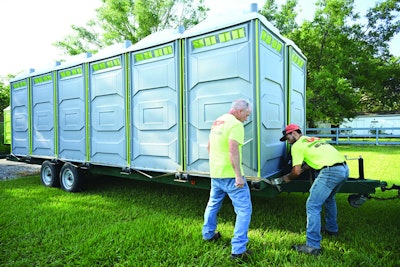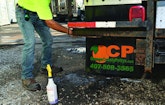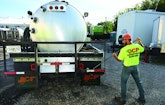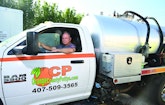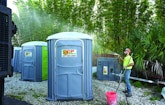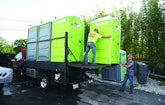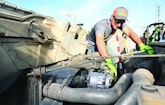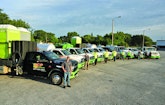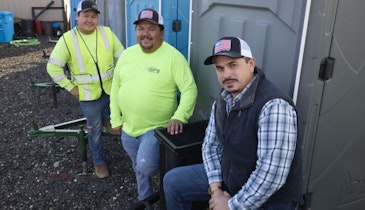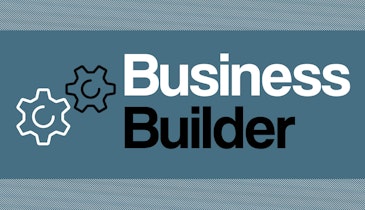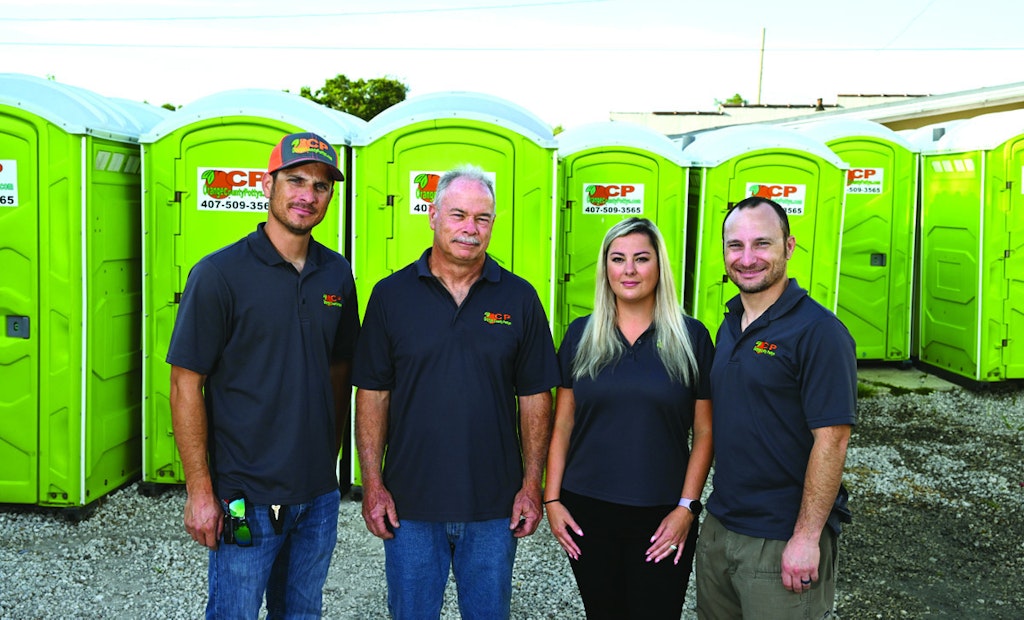
The office staff, from left, are Joey Stoddard, Jim Stoddard, Julia Bass and Jimmy Stoddard Jr. (Photos by Preston Mack)
Interested in Business & Technology ?
Get Business & Technology articles, news and videos right in your inbox! Sign up now.
Business & Technology + Get AlertsIt’s not often that difficulty finding employees translates into business success. But oddly enough, that’s exactly what helped change the business fortunes — and the career paths — of master plumber Jim Stoddard and his son, Joey, the owners of Orange County Pottys in suburban Orlando, Florida.
The Stoddards’ business odyssey began in New York in 1990 when Jim, tired of harsh winters, moved his family business, Stoddard Plumbing — founded in 1920 by his grandfather — south to Florida. But by around 2014, Jim and Joey, who are third- and fourth-generation plumbers, ran into a problem worse than snowstorms, icy temperatures and frozen pipes.
“It got to the point where it was impossible to find good plumbers,” recalls Jim, 62. “So we brainstormed about what to do and came up with either paying more money, trying even harder to find employees or quitting plumbing altogether and starting a new business.”
The duo opted for the latter option and Orange County Pottys was born, creating an exit strategy from plumbing for the father-and-son team.
The restroom rental business was attractive for several reasons. For starters, it’s a very replicable business, Jim says.
“It’s hard to duplicate plumbing, but it’s easy to duplicate restroom service,” he says.
Furthermore, it’s easier to find employees because the expertise needed for servicing restrooms isn’t nearly as technical as plumbing, which requires years of training, he adds.
“That’s not an insult to our drivers, either,” Jim points out. “My father used to say you have to grow a plumber — and it takes time. It’s kind of like an orange tree, which takes a few years before it bears fruit.”
Then there was the allure of residual income (also known as passive income), which is generally defined as the revenue that keeps coming in after initial capital investments are paid off — things such as rental and interest income, dividend payments and so forth.
“Those restrooms are sitting out there on job sites, making money for you while you sleep,” Jimmy explains. “In a sense, you’re billing people around the clock. With plumbing, you do something, you get paid for it and you go home.”
The Stoddards straddled both plumbing and restroom-rental services until the end of 2022, when they closed Stoddard Plumbing to focus exclusively on Orange County Pottys.
Monthly rentals — primarily for construction sites — generate around 70% of the company’s revenue, while special events contribute the balance.
OPERATIONAL EFFICIENCY
From the way route drivers are trained to clean restrooms to the used vacuum trucks that the Stoddards outfit and repair themselves, the business is run with a lean and frugal philosophy — one key to its success, Jim says.
“We’re always looking for the most efficient way to get jobs done,” says Joey, age 35. “If we can do the same amount of work in less time, we do it. If we can clean toilets more efficiently and at a lower cost, and keep our equipment costs lower, we can pay our guys better.
“From what we hear, we pay more than our competitors, and higher pay reduces turnover,” he continues. “Turnover costs you money, so if you can prevent turnover by treating guys right and paying them well, you’ll make more money in the long term.”
Joey cites the company’s employees as another key to success.
“We’d be nowhere without them,” he says. “They’re honest and they show up and do a good job every day. A company is only as good as its employees and we’re blessed to have an amazing staff. We can’t thank them enough for all their contributions.”
At regularly held company meetings, employees consistently provide feedback that increases efficiency and profitability, Jim says.
“We always come out of those meetings knowing more than when we came in,” he says. “We all learn from each other. It’s a pretty simple business, but it’s full of details that can ruin a day.”
Jim also credits his oldest son, Jimmy Jr., a former U.S. Marine who played a critical role during the company’s early years. He still helps out on weekend special events, Jim says.
Another pivotal move was hiring Julia Bass as office manager in early 2019, Joey says.
“Before Julia came on board, it was all on my dad and I to answer phones and schedule service,” he explains. “So to have someone who could answer the phone and deal with customers was very helpful. She handles pretty much everything — we couldn’t do it without her.”
CASH IS KING
Reducing equipment costs — especially for vacuum trucks — also boosted growth. Jim firmly believes in buying quality used trucks and only buying them when the company could afford to pay cash. There are PROs on both sides of the new versus used equipment debate, but this philosophy has worked for Orange County Pottys.
“We’ve consciously chosen to buy older equipment and avoid new-truck loan payments and more expensive insurance payments,” says Jim. “That’s the sword we’re dying on.”
The company owns nine vacuum trucks, with three serving as backups. The fleet includes a 2015 Ram 5500 with a 1,100-gallon waste/400-gallon freshwater aluminum tank from Lane’s Vacuum Tank; a 2016 Ram 5500 with a 1,100-gallon waste/400-gallon freshwater aluminum tank from FlowMark; a 2018 and 2020 Ram 5500 with 750-gallon wase/350-gallon freshwater steel tanks from Crescent Tank; and a 2015 Ram 3500 with a slide-in 300-gallon waste/150-gallon freshwater aluminum tank made by Imperial Industries. All the trucks feature Masport vacuum pumps.
The fleet also includes a 2001 Ford F-250 equipped with a 200-gallon waste/100-gallon freshwater aluminum tank made by Imperial with a Conde pump from by Westmoor Ltd.; a 2002 Ford F-250 with a 300-gallon waste/150-gallon freshwater aluminum slide-in tank and a Jurop/Chandler vacuum pump; a 2005 Ford F-650 with a 1,100-gallon waste/400-gallon freshwater aluminum tank from Imperial with a Masport pump; a 2004 Ford F-550 with a 700-gallon waste/300-gallon freshwater steel tank built by Keith Huber Corp. with a Jurop pump; and a 2001 International 4700 with a 700-gallon waste/300-gallon freshwater steel tank and a Jurop/Chandler pump.
Most of the trucks are equipped with four-wheel drive.
For branding purposes, the truck tanks and bumpers are painted green and the truck cabs are white.
“Most people wouldn’t know the trucks are old,” Joey says. “Our trucks are seen a lot because we drive a lot of miles every year, so we tell our drivers that they have to always keep their trucks clean,” he adds.
The company also owns about 800 restrooms and 50 hand-wash stations from PolyJohn; a dozen restroom trailers from JAG Mobile Solutions, Black Tie Products, Wells Cargo, Rich Specialty Trailers, Forest River (Mobile Restrooms Inc.), Pace American and Ameri-Can Engineering; and about 35 250-gallon plastic holding tanks from PolyJohn.
SMALLER IS BETTER
The company also increases efficiency and reduces truck downtime because Joey is a mechanic whose primary job is to keep the fleet up and running.
“The key is shaving an in-house mechanic,” Joey says. “We ask a lot of these trucks and can’t expect to not have any issues when they’re running 50 hours a week, so you have to stay on top of maintenance and catch problems before they become bigger problems.”
Most of the company’s trucks carry somewhat smaller-capacity tanks because service routes are short, plus the Stoddards believe carrying less weight helps trucks last longer.
“Our trucks can handle our routes without any problem,” Joey says.
Jim also says smaller-diameter wheels — 19-1/2 inches versus more common 22 1/2 inches – save the company money because larger tires are more expensive. Furthermore, he avoids buying trucks with air brakes because they require a commercial driver’s license, which makes it more difficult to find qualified route drivers.
In general, less is more when it comes to trucks, Joey says.
“Bigger trucks weigh more, which results in more wear and tear, plus they’re more dangerous to drive, require more expensive insurance and have less maneuverability than smaller trucks,” he contends. “We’re very conscious about cost of ownership.”
Also, bigger trucks generally don’t have four-wheel drive, which many of the company’s trucks need to handle job sites that often are full of mud and sand, he adds.
CUSTOM FLAPS
The trucks also are distinctive because of their mud flaps, which feature the company’s name, not the name of the truck manufacturer.
“Why shouldn’t our name be on the mudflaps?” Joey asks, noting the company started having the customized flaps made around 2018. “Dad always joked that we’d know when we’ve truly made it when we get our own mud flaps. So I guess now we’ve made it.”
“Putting someone else’s name on our truck mud flaps would be like us wearing a Nike T-shirt instead of an Orange County Pottys T-shirt,” Jim adds.
USA Flap makes the mud flaps. At about $38 to $40 a pair, they’re relatively inexpensive; the biggest cost is an upfront charge to create a mold, which costs more than $1,000. The company then keeps the mold on file for future orders, Joey says.
Jim says it’s debatable whether or not the customized mud flaps provide value from a marketing standpoint.
“But there’s no reason not to have your own,” he says.
HOLDING STEADY
As for what lies ahead, the Stoddards are tapping the brakes at the moment, with no plans for significant growth.
“We’re at a tipping point where taking the next big leap would cost a lot of money in terms of more employees and more trucks,” Joey explains. “Everything is too expensive right now, so we’re kind of in a holding pattern until we can comfortably make a move.”
But as they look back at what they’ve accomplished after their bold career U-turn, the father-son team has no regrets about their decision to trade in pipe wrenches for portable restrooms.
“It’s been a good move for a lot of reasons,” Jim says. “This is a much more controllable business in a lot of different ways, which I really appreciate after coming from a business where we didn’t have that kind of control.
“Most of what we do is planned, which makes life a lot easier,” he continues. “I’ve enjoyed this business more than anything else I’ve tried.”
